Tucked away in a Mazgaon bylane is Mumbai's oldest surviving piano making and rebuilding business. This is the story of how they managed to stay in tune for 115 years
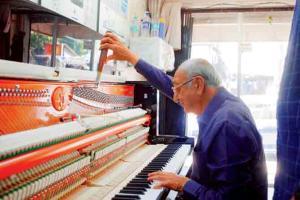
Amritlal tuning a Feurich upright with a tuning wrench. Pics/ Ashish Raje
It's not a well-acknowledged fact but music was Satyajit Ray's first love. Starting with Teen Kanya in 1961, he started composing music for his films. In an interview with Bert Cardullo, he recalls that although he grew up in a home surrounded by Indian classical music, he nurtured a love for Western classical music at college; he was strapped for cash and couldn't collect beyond one movement of a symphony or concerto. When he started working, he began buying musical scores. His bedside reading material, pocketbooks of German scores, was sourced from Bombay's S Rose and Company — the city's oldest music business founded in 1847.
Changing times
ADVERTISEMENT
Housed at Fort's Rampart Row, S Rose & Co was where Ramji Premji Mistry, a Daman native and skilled woodworker learnt to make pianos from the British, eventually becoming its chief technician. In 1905, the company's business began to witness a slide, and Mistry started to make his own models. In 1951, he launched his own shop in Fort called RP Mistry & Co, which later moved to Mazgaon. Despite changing initials — RP Mistry changed to D Mistry after his son Dayashankar took over, before finally being called A Mistry & Co in 1956 as Amritlal, a third-generation Mistry took the helm — it sustains its 115-year piano making and rebuilding legacy.
Brand new tale
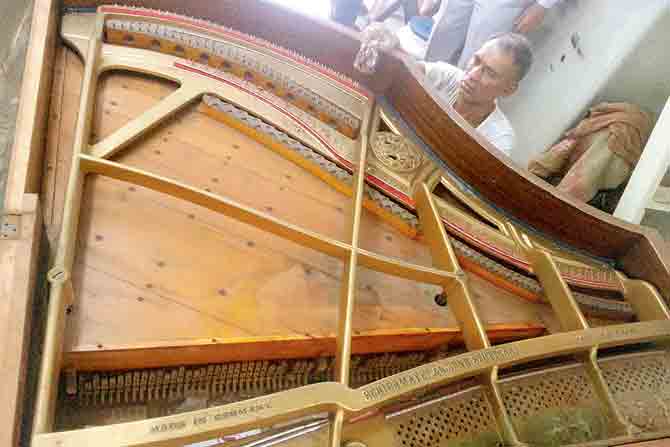 Before
Before
We meet Amritlal, 83, and his son Ajay, 41, at the store's present location on Mazgaon's Champsi Bhimji Road, where a black Feurich upright strangely brightens the jaded interiors. The Viennese piano brand is a new addition to their reselling business; they also resell Grotrian, a German luxury piano company, from where Ajay had pursued his training. For a brief period, you could find an A Mistry & Co piano, too. "We had to stop production in 2013 because Indians want branded pianos. It is sad but we underwent many problems. In India, it is not possible to make the iron frame of the instrument and so a division of Feurich helped us build it. Thus, the costs were high but there wasn't any demand," Ajay says.
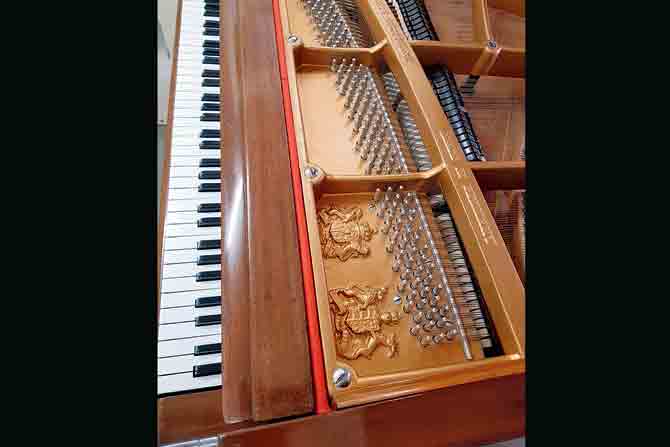 After
After
The Mistrys and their workers operate from 9.30 am to 5 pm. It's a strenuous job, Ajay says, one that requires him to exercise all his senses. In order to rebuild a piano, the company sources old pianos. "If the parts are good, we don't change anything," he says, proceeding to show us the action mechanism of the instrument and adding, "In uprights, you have 13,000 moving parts. The work of a technician is to bring all these parts in sync; you also need to learn tuning that involves the board and pins of the instrument as well as regulation which covers adjustments of parts and pedals." To illustrate his point, Ajay puts forth a lucid analogy of a blindfolded pianist attempting to climb a series of steps [or keys]. "Each step has to be equidistant so s/he can run up and down smoothly. If the steps have huge gaps, the sound generated is hard."
The family residing in Mazgaon also has a workshop in the building adjacent to the store. A wide elevator, that Amritlal mentions serves as the instrument carrier, takes us to the room where workers are tasked with rebuilding two pianos that lay dismantled at the moment — a Steinway grand and Bechstein upright. There, Ajay shows us the heart of the instrument, the tuning pin block. "When the tuning pins are drilled, the pressure from the strings is enormous, about 14 tonnes in an upright model. That's also why the frame is made of cast iron. The fitting of the pin block is a skill I learnt in Germany," he says.
A gift to the city
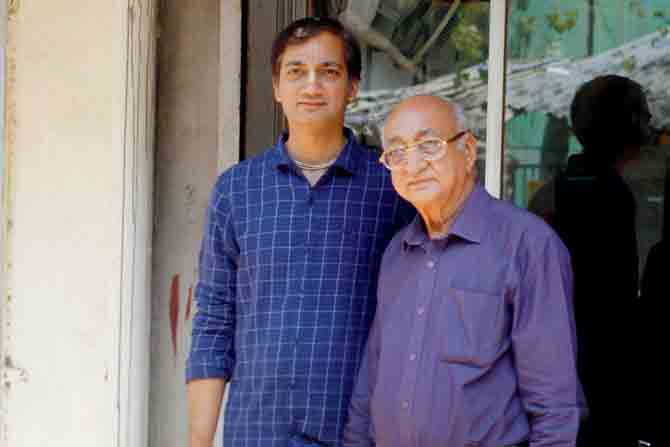
The Mistrys maintain that they are technicians, not musicians and so, can't play the instrument. "I did attempt to learn the piano in 2012 but couldn't give it enough time. I didn't feel like I was doing justice to it. Plus, I don't want to be around a piano 24/7," Ajay laughs. The two also have a close association with the National Centre for the Performing Arts (NCPA). Amritlal says, "I started working at the NCPA in 1997. Homi Bhabha was pleased with me. I used to sit next to him. Now my days are over, and my son goes there. But I still work because I really do love the instrument."
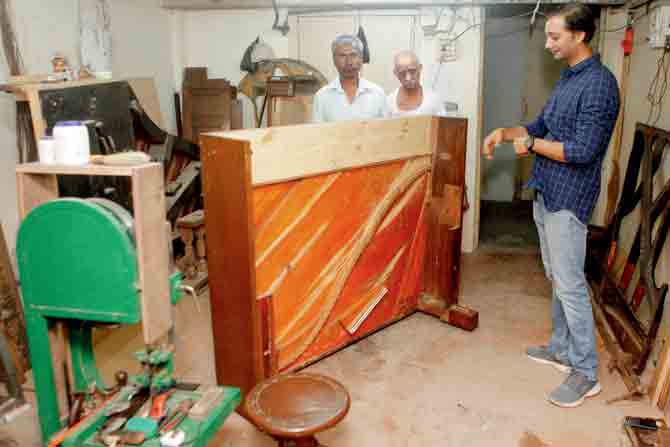
The iron frame, Ajay Mistry says, requires a special bronze powder that varies across European piano brands and isn’t available in India. So, rebuilding requires them to source the specific colour.
The octogenarian mentions his work with the "top people" — the Tata, Bajaj and Ambani families — but at the end of the day, it's the smiles of all their customers that are most important. Ajay says, "We just want to make good pianos and give artistes the best experience in Mumbai; they shouldn't look back in dismay and say, 'Oh! What have I played!'"
Call 9892112603 (to purchase, service or rebuild a piano)
Catch up on all the latest Mumbai news, crime news, current affairs, and also a complete guide on Mumbai from food to things to do and events across the city here. Also download the new mid-day Android and iOS apps to get latest updates
 Subscribe today by clicking the link and stay updated with the latest news!" Click here!
Subscribe today by clicking the link and stay updated with the latest news!" Click here!







